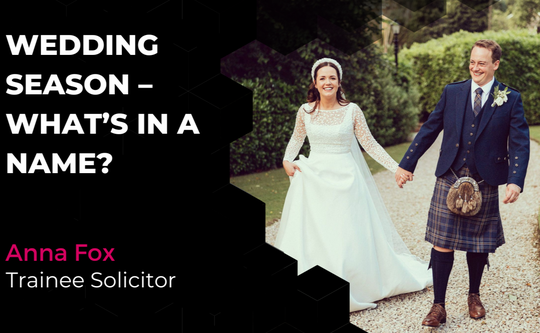
Marriage is always topical in our team but especially so as of late – no, we’re not talking about J.Lo and Ben – our very own Gabrielle tied the knot on 15 July 2022 (see picture)! The revelation however that J.Lo made the change to become Mrs Jennifer Affleck lead to a discussion on name changes in Scotland so we have put together a brief ‘how-to’ guide for changing your name – and reverting!
How to legally change your name in Scotland
When couples marry or register a civil partnership, either partner can assume the other partner’s surname or combine it with their own to have both surnames. This new surname can be used for all purposes, however you will need to produce evidence that you have changed your name for most official purposes.
To assume your partner’s surname, your marriage or civil partnership certificate is sufficient proof to instigate this change. Simply provide a copy of your marriage certificate to the relevant institutions e.g. UK Passport Office, banks, DVLA or professional bodies. They will note the change and have new documents issued to you with your new surname.
If you wish to go a step further and have your change of name officially recorded, which would also apply to anyone changing any name, you can do so with the National Records of Scotland. This change will be recorded against your original birth entry. The change of name is recorded on a public register which means that anyone can access and see your name change. This process and its effect would apply to a married surname as it would to a complete change of name, as might be the case for someone who is transitioning.
Where it is not possible to officially record a change of name in Scotland because you were neither born nor adopted in Scotland, you can use one of the services which enable you to change your name by deed poll. It is recommended that if you later wish to provide evidence that you have changed your name, then you should enrol your deed poll document in the Supreme Court in London which is also a public register.
It is important to be aware that there are some instances where because a change of name is recorded on a public register to which anyone would have access, it would not be in your interest to have the change recorded, for example, survivors of domestic violence.
There is another process in Scotland which allows an individual to change any name but which does not involve recording it in a public register. This is by using a statutory declaration. A statutory declaration is a formal document which can be drawn up and its contents sworn as accurate before a notary public or justice of the peace. Swearing a document has the same status as giving evidence in Court.
Having changed your name, what happens if you wish to revert the name you changed?
If you divorce or dissolve a civil partnership, an extract decree of divorce or dissolution is sufficient documentation to restore your previous surname.
If you used the process of recording a change of name with the National Records of Scotland, then you will have to go through that same official procedure again in order to revert to your earlier name and have your birth entry amended to your previous name.
If you have any questions on how to legally change your name in Scotland, or would like legal advice in relation to a marriage breakdown or other family law matter, contact our Family Team.
















